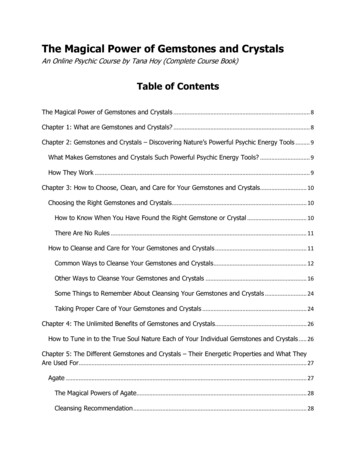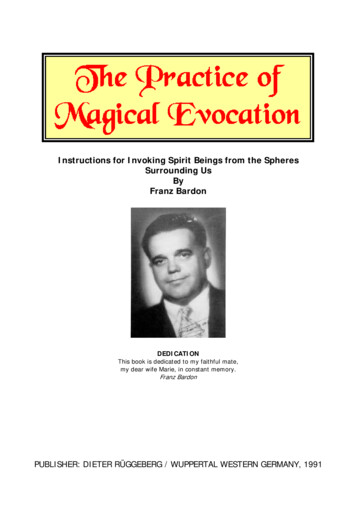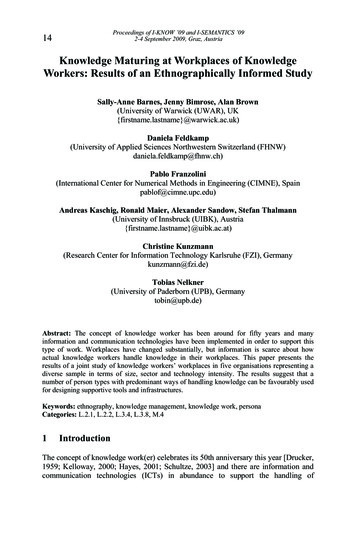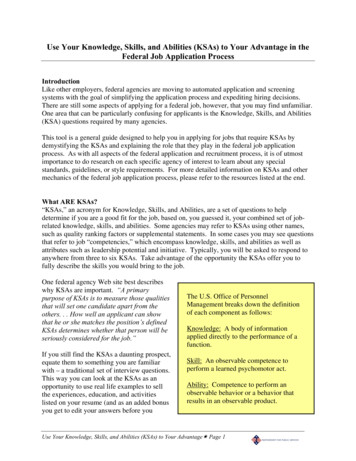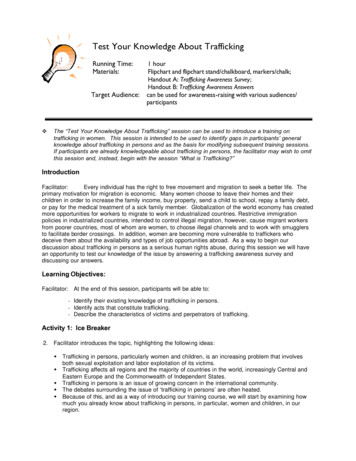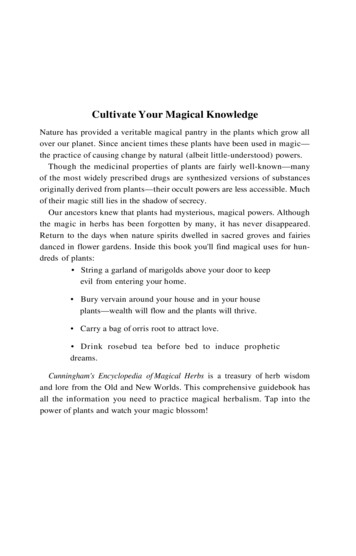
Transcription
Cultivate Your Magical KnowledgeNature has provided a veritable magical pantry in the plants which grow allover our planet. Since ancient times these plants have been used in magic—the practice of causing change by natural (albeit little-understood) powers.Though the medicinal properties of plants are fairly well-known—manyof the most widely prescribed drugs are synthesized versions of substancesoriginally derived from plants—their occult powers are less accessible. Muchof their magic still lies in the shadow of secrecy.Our ancestors knew that plants had mysterious, magical powers. Althoughthe magic in herbs has been forgotten by many, it has never disappeared.Return to the days when nature spirits dwelled in sacred groves and fairiesdanced in flower gardens. Inside this book you'll find magical uses for hundreds of plants: String a garland of marigolds above your door to keepevil from entering your home. Bury vervain around your house and in your houseplants—wealth will flow and the plants will thrive. Carry a bag of orris root to attract love. Drink rosebud tea before bed to induce propheticdreams.Cunningham's Encyclopedia of Magical Herbs is a treasury of herb wisdomand lore from the Old and New Worlds. This comprehensive guidebook hasall the information you need to practice magical herbalism. Tap into thepower of plants and watch your magic blossom!
About the AuthorScott Cunningham practiced elemental magic for over twenty years. Hewas the author of more than thirty books, both fiction and non-fiction, themajority of them published by Llewellyn Publications. Scott's books reflecta broad range of interests within the New Age sphere, where he was highlyregarded. He passed from this life on March 28, 1993, after a long illness.
CUNNINGHAM'SENCYCLOPEDIAOF MAGICALHERBSSCOTT CUNNINGHAMLlewellyn PublicationsWoodbury, Minnesota
Cunningham's Encyclopedia of Magical Herbs. Copyright 1985 by ScottCunningham, and 2000 by the Scott Cunningham estate. All rights reserved. Nopart of this book may be used or reproduced in any manner whatsoever, including Internet usage, without written permission from Llewellyn Publications,except in the case of brief quotations embodied in critical articles or reviews.SECOND EDITIONSixteenth Printing, 2008First edition, twenty-seven printingsCover Image by Hrana JantoFRCover design by Lisa NovakHerbal Consultant: Elizabeth Ann JohnsonInterior design and editing by Matthew SegaardLibrary of Congress Cataloging-in-Publication DataCunningham, Scott, 1956-1993Cunningham's encyclopedia of magical herbs.Bibliography: p.Includes index.1. Magic 2.Plants I. Title. II: Title:Encyclopedia of magical herbs.BF1623.P5C86 1984133.4'3 84-48091ISBN 13: 978-0-87542-122-3ISBN 10: 0-87542-122-9The old-fashioned remedies in this book are historical references used forteaching purposes only. The recipes are not for commercial use or profit. Thecontents are not meant to diagnose, treat, prescribe, or substitute consultation with a licensed healthcare professional.Llewellyn PublicationsA Division of Llewellyn Worldwide, Ltd.2143 Wooddale Drive, Dept. 978-0-87542-122-3Woodbury, Minnesota 55125-2989, U.S.A.www.llewellyn.comLlewellyn is a registered trademark of Llewellyn Worldwide, Ltd.Printed in the United States of America
DedicationFor Mom and Dad
Other Books by Scott CunninghamThe Complete Book of Incense, Oils, and BrewsCunninghams Encyclopedia of Crystal, Gem & Metal MagicCunningham's Encyclopedia of Wicca in the KitchenDivination for BeginnersDreaming the DivineEarth, Air, Fire & WaterEarth PowerHawaiian Magic & SpiritualityLiving WiccaMagical AromatherapyMagical HerbalismTruth about Herb MagicTruth about WitchcraftThe Truth about Witchcraft TodayWicca: A Guide for the Solitary PractitionerBooks with David HarringtonThe Magical HouseholdSpell CraftsVideos by Scott CunninghamHerb MagicBiographyWhispers of the Moon by David Harrington & de Traci Regula
ContentsAcknowledgementsPrefaceviiiixP a r t I: T h e Basics1Chapter One: The Powers of HerbsChapter Two: Magical Ways37Chapter Three: Spells and ProceduresChapter Four: Magical Intentions1117P a r t II: T h e H e r b sHealth Codes Used with the Herbs21266P a r t III: Tables & Appendices267Gender269Planetary RulersElemental RulersMagical IntentionsColors and their Magical UsesGlossaryMail-Order SuppliersThe Magical Properties of OilsFolk Names Cross-ReferenceAnnotated BibliographyIndex271274276284285287288289308324
AcknowledgmentsMy thanks go to these and many other individuals who shared informationor offered criticism: Don Kraig, for suggestions on an early draft of this work;Ron Garst for spending a few evenings talking of oils and incenses; Ed andMarilee Snowden for (again) allowing me access to their library, as well as toMs. Snowden for proofreading the final manuscript; Daniel Weime for sharinghis herbal secrets and allowing some to be published here, and to all my friendswho supported and encouraged me during the completion of this work.viii
PrefaceI was a young man when I began to write what was eventually to becomeMagical Herbalism. Frustrated at the lack of information concerning herbmagic and at the surfeit of interest in my teachers and fellow occult students Iset out to investigate this nearly lost art.This search took me through worlds and experiences of which I had scarcely dreamt. Nights spent reading ancient books and manuscripts while sippingherbal teas led to practical application; I collected herbs by moonlight andbrewed up spells on deserted beaches. Slowly the pieces fell into my hands.At last I gathered up the threads of the ancient ways and, from them, wove asystem of herb magic.The more I experienced herb magic the more I realized its true powers. Itmay well be the most ancient and yet the most practical form of magic, for itstools grow all around us, even in the concrete-laden cities in which so manyof us live.After witnessing the power of herbs I decided to write a book explainingthese lost ways. Thus, Magical Herbalism was born. Five years and severaldrafts later it was published.During this process my research into and work with herb magic hadn'thalted. Most of what I was learning could not be incorporated into MagicalHerbalism, and so I decided that it had to wait for a later book. My early workwas almost solely concerned with Old World plants, and this is reflected inMagical Herbalism. In recent years I have investigated the magical uses ofplants of North and South America, the Near East, the Far East and Polynesia.(Some of these Polynesian plants have been included in this work, but themajority must wait for a future book on Hawaiian magic: Hawaiian Magic &Spirituality, Llewellyn, 1994.)With the amount of new information I had uncovered I soon realized thatthe second herbal would be a veritable encyclopedia of herb magic. Hence,this book.The present work is not a guide to herb magic, only minimal information is given in these pages concerning it. That ground is covered in MagicalHerbalism. Do you wish to attract a lover? Carry a bag of rose petals or anix
x Cunningham's Encyclopedia of Magical Herbsorris root. Want to stop a toothache? Chew an elder twig and drive it into awall. This is the type of magic that abounds in these pages—quick, uncomplicated, non-ritualistic. All-purpose spells are presented in the first section ofthe book for use where needed.While most of the magic presented here deals with everyday problems,more complex subjects are also broached in the text—invisibility, materialization of spirits, attaining immortality and so on. Such information is presented because it is traditional, interesting, and romantic, not necessarily forits practical application. Similarly, the references to guarding against sea serpent bites and causing fairies to appear are included because such information fires the imagination, a necessity for effective magic.This is not a book of quaintly impossible spells; it is an infinitely practicalcollection of herb magic which anyone can put to use.I have limited myself strictly to the magical uses of herbs in this book; nomedicinal information is presented here because there are a wealth of reliableguides available in this area. I have also bypassed the mythological and historical backgrounds of most of the plants except where relevant.Those who seek destructive magic within these pages will be disappointed;none exists here, for such magic leads to its user's destruction.A work of this type can never be completed; more secrets lie in waitingfor discovery. It is the author's responsibility to decide when to stop nurturing and send a book out into the world to find its legs. I do so now, with thehope that it will stimulate others toward discovering and using the secrets ofherb magic.
PartiThe Basics
1The Powers of HerbsHow does it work? When people discover I'm a magical herbalist, this is oneof two questions asked. The other usually refers to my state of mental health.Nonetheless, the first question is a valid one and has never been satisfactorilyexplained.The basis of herb magic—and all magic—is the power. This power hasworn many names and forms through the centuries; at times even its existence was kept secret; at others it was common knowledge.The power is that which generated and maintains the universe. It is thepower that germinates seeds, raises winds, and spins our planet. It is the energy behind birth, life, and death. Everything in the universe was created by it,contains a bit of it, and is answerable to it.In other words, the power is the life-force, the stuff of creation. It is thevery substance of existence itself.The power as I see it has no name. It has been deified and anthropomorphized into a thousand-thousand Gods and Goddesses, spirits, demons andother unearthly beings. It has been only partially explained in the terms ofscience, which today is still "discovering" some of its aspects. The power hasplayed an important part in the evolution of the human race, for better orworse. All religions have tapped into it using different symbols and rites, andall magicians have wielded its powers.Above the ritual and religion and magic the power exists, changeless in itseternal change. The power is in everything, and everything is in the power.(One of the problems of some modern religions is that they assert that thepower is outside us, and not within.) Call it what you like, visualize it as youmay, the power really is the power.Definition: Magic is the practice of causing change through the use of powersas yet not defined or accepted by science.I can cause change by accepted means (by calling a friend on the phone I canfind out how she's doing); this is not magic. But when I do not have access to aphone, or my friend does not answer, I can make a sachet of thyme, yarrow, andbay, tie it around my neck, still my mind and, using my herb-fortified psychic3
4Cunningham's Encyclopedia of Magical Herbspowers, discover if she is all right. This is its practicality: magic can be usedwhen no other means are available.What methods are at the disposal of most people to guard their homesagainst theft? How can a lonely woman attract a love into her life? In whatmanner, beyond visiting doctors and buying medicines, can most people aidtheir bodies to combat illness?Most people would not know how to answer the above questions save inthe most physical ways: a lock, a new perfume and bedrest may be suggestedas solutions. These are fine starts, but they can be supplemented with surermethods—they can be backed up with magic.Magic is useful for solving these, and other common problems, but itbecomes indispensable when dealing with occult matters. Need a glimpseinto the future? Make a tea of rosebuds, drink it directly before going to bed,and remember your dreams. Or, wear some deerstongue wrapped in yellowcloth. Do you believe you're the target of a hex or curse? Doctors will directyou to the nearest psychiatrist; Witches and Magicians will tell you to sprinklered pepper around your property and then bathe in mimosa flowers. Magichas many (but not quite all) of the answers.There is an important point running through these words: magic, howeversimple it might seem, provides practical solutions to problems.The power behind herb magic is formless, shapeless, eternal. It doesn't carewhether you call on it in the name of a Witch Goddess or the Virgin Mary—ortap it within no religious framework at all. It is always there, present in abundance no matter where we are or where we travel in the universe.Though the power is formless, it takes on many forms: a wildebeest has thepower, so does a computer, or a dandelion. Some materials contain higherconcentrations of the power than others; these include plants, gems, and metals. Each substance also contain different types of power, or vibrational rates.The vibrations of a piece of pine wood, for example, are far different fromthose of a perfect, faceted diamond.This vibratory rate is determined by several factors: chemical make-up,form, density, and so on. The powers resident in herbs are determined bythe plant's habitat, scent, color, form, and other considerations. Similar substances usually possess similar vibrations.Herb magic, then, is the use of herbs to cause needed changes. These plantscontain energies—each as distinct as human faces. For maximum effectsthe herbs chosen for a spell should possess vibrations that match your need.Cedar is fine for attracting money, but wouldn't be of help in a fertility spell.
The Powers of HerbsTo practice herb magic you must know the powers of the plants. This bookcontains that information. To fulfill a need, just manipulate the herbs to givetheir powers direction. It is that simple.Herb magic is easy because the powers (i.e., vibrations) lie in the herbsthemselves. No outside forces need be called into play, for the power is resident within the organic matter. A few simple procedures are all that is necessary. These "rites" include tying knots, boiling water, lighting candles, sewingand burying things in the Earth. More important than its simplicity, perhaps,is the fact that herb magic works.How does it work? First, there must be a reason to call upon magical powers. This reason is a need. A desire often masquerades as a need, but in magica "desire" is not enough; there must exist an all-encompassing need.The nature of the need determines which plants are used. Attracting love,for example, is a common magical need and several dozen plants do the job.(For a comprehensive listing of plants and their corresponding magical needs,see Part III of this book.)Next, a spell or ritual may need to be devised; much herb magic doesn'tneed a complete spell but some of it does. This spell may be as simple as tyingup the herbs in a piece of cloth, or placing them around the base of a candle,lighting the wick, and visualizing your need. If you wish, your spell can becomplex, involving boiling water in a cauldron over a mesquite-wood fire atthe edge of the desert while waiting for the Moon to rise, before throwingroots and leaves into the pot. All-purpose spells are included in chapter 3.Third, the herbs can be enchanted (chapter 3) to ensure that their vibrations are attuned to the need.Fourth, the spell is worked, in complete confidence and secrecy. Not thatmagic is anything to be ashamed of, but rather because mocking glances anddisbelief only serve to cause you to doubt yourself and hinder your magic'seffectiveness.Fifth, once the spell has been worked, it should be forgotten. This allowsit to "cook" and bring your need into manifestation. (When baking a cake, ifyou look into the oven every few minutes the cake will be spoiled. In magic, asin cooking, keep the oven door shut!) Attempt to forget the spell completely.And there you have it. This is how herb magic is worked. Does it soundbasic? It is. These are the first steps. As with any art the student may takemagic further, exploring strange corners. Sensibly, few wish to venture too farfrom this familiar, homey magic. There are dark ways in herb magic as thereare in every aspect of life. Those who wish to pursue such paths, to wreak5
6Cunninghams Encyclopedia of Magical Herbshavoc and control or kill other human beings, shall receive the heavy penaltyfor negative working.The power is neutral. It cannot be divided into positive and negative energies. Power is power.It is our responsibility as Magicians (wielders of the powers) to work withit toward beneficial ends. We need not become ascetic or saints to help others,or to improve our lives. All we need do is use herbs in loving ways.Magic, as it was understood in long-ago days, was a divine act. This is literally true; in magic we become one with and utilize the power, which has beenfashioned into a multitude of deities.It is an awesome feeling, and a greater responsibility, this wielding of power.The moment it is used for negative ends, divinity quickly flees. However,when magic is used for positive ends our lives become richer and happier.When one embarks down the dark path of negativity, the suffering this causesto others spills into the Magician's life until, in the end, he or she is utterlydestroyed.Dramatic words? Perhaps—but their essence is true. For this reason, nonegative magic is included in this book. But to those who desire to help themselves and others with the old ways of herb magic, welcome!
2Magical WaysThough there isn't room here for a complete explanation of the methods andtheories of magic, the following short essays discuss some of the most important points. For further information see Magical Herbalism.TimingThe ancients created magical systems with varying degrees of complexity. Onearea in which they excelled was the art of timing ritual acts in accordance withastronomical phenomena. Some of these systems were rigidly controlled bythe phases of the Moon; others took the seasons into account, and in othersstill, the stars and their positions were all-important.Some of these systems are still in use today, with good results. But any system can kill off spontaneity and hinder the effects of magic—even its veryperformance. Timing is important, true, but there should be only one inviolable rule: magic is used when needed.If I have a headache which disturbs my sleep or work, I cannot wait forthe Moon to enter the proper sign, or until Ursa Major rises; I need reliefimmediately.This is a trifling example but it holds true for all magic. It is no use waitingthree weeks to perform a money spell if your bills must be paid by the end ofthe week. I am not arguing that timing with the planets, stars, seasons, Lunarphases and so on does not provide extra power to spells: I am simply arguingagainst the necessity for such extra power. If the magic works it will work atany time of the day or night.I can hear ghostly complaints from Magicians: "You can't perform lovespells during the waning Moon"; "Money spells fail unless performed on aThursday during Spring while the Moon is in Taurus, at the third or tenthhour of the night."Such pronouncements are common in magic—usually from people whodo little or no practical work. Spells need not have ideal astronomical, seasonal, and weather conditions to be successful.7
8Cunninghams Encyclopedia of Magical HerbsThose who wish to follow the old ways of timing magic with the Sun,Moon, and stars can find this information in any good magical textbook, butit is by no means a necessity.If you need courage before facing a job interview, don't look at the phase ofthe Moon—grab some thyme and get on with it!Though some instances of magical timing are mentioned in this book,especially regarding the collection of specific plants, they may be followed, ornot, as you please, with almost identical results.ToolsHerb magic requires blessedly few tools compared to other types of magic. Amortar and pestle set is necessary to grind herbs and seeds, and a large wooden or ceramic bowl will be needed for enchanting herbs. Keep a large glass orenamelled pot (avoid metals) exclusively for brewing infusions or "potions."Simple sewing supplies (needles, pins, scissors, cotton thread, thimbles) willcome in handy in making sachets and poppets, and a good stock of variouscolors of cotton or wool cloth and yarn will be needed.Candles and herbs, of course, are necessities, as is a censer (incense burner),candleholders, charcoal blocks, and jars in which to store your herbs.The AltarThis is also called the spell table or work table, but I like the sound of "altar,"which is far less awkward, even though it gives a religious association to magicwhich may not always be deserved. However, "altar" will be used throughoutthis book.A great deal of magic does not need the presence of an altar, but certainrites do. When performed at home, the altar is the place where spells are cast.It can also be used as a work table where herbs are enchanted, sachets composed, and where, in general, all magical work is done.An altar may be any flat surface on which you can place candles, an incenseburner, herbs, and any other materials needed for a spell. It can be the top ofa coffee table or dresser, or a section of the floor. Wherever you can find aplace is sufficient.Some people who wish to acknowledge their religious beliefs place symbolsof their faith on the altar. Statues and holy books are common, but any objectswith which you feel comfortable may be placed on the altar, such as luckycharms, fossils, rocks, shells, and so on. Such natural objects may actuallyempower your magic further.
Magical WaysI cannot stress too strongly the advisability of performing magic outdoorswhen possible. Indoor spells work, of course, and most of us have to substitute a living room or bedroom for a forest clearing or lonely beach. Magicmust be practical.Outdoor altars aren't always necessary; when they are necessary, they usually consist of a cleared section of ground, a flat rock, or a tree stump, butingenuity can aid the Magician here. The altar is simply a place to performmagic, and is limited only by your imagination.VisualizationThe most "advanced" magical technique needed in herb magic is visualization; i.e., forming a picture in your mind of your need. (See Practical Guide toCreative Visualization by Denning and Phillips, Llewellyn Publications.)Many books have been written on this subject, for students often complainthat they have difficulty visualizing clearly. Usually, the ability is present buthindered by inhibitions.Can you, at this moment while reading this book, see your mother's face?What about that of your closest friend, or worst enemy?This is visualization. In magic visualization is used to direct the power byforming a picture of your need: a car, a love, employment, and so on. If youneed an object, visualize yourself owning it; if a job, see yourself working; andif love is needed, visualize a ring slipping onto your finger, or any symbol youassociate with love.The need must be visualized as if you have already obtained it, or as if ithas already come to fruition. Use your creativity and natural visualizationtalents to really see your need. Don't think of the reasons behind your need;simply see it in concrete terms.As with everything from golf to cooking, practice makes perfect. Even ifyou're never capable of completely visualizing your need, magic will work aslong as the intention is there.Other ConsiderationsThis is a convenient heading for a variety of short topics, as evidenced by thediversity of material below. When possible, bathe before performing magic. Asachet of purification herbs added to the water can be a great help, also.Dress in clean, comfortable clothing, or nothing at all, as you wish. Somepractitioners wear robes and jewelry but this isn't necessary.It is also not necessary to abstain from sex, food, or liquids prior to magic.Do so if you wish, but it simply isn't a requirement.9
Cunningham s Encyclopedia of Magical HerbsMost of the magic in this book is down-to-earth and deals with everydayproblems. However, for important spells, especially those that deal with otherhuman beings, perform a divination to make certain that the spell is necessary before using magic. Information and techniques of divination are included in my book Earth Power (Llewellyn) as well as Magical Herbalism.As a rule of thumb, don't cast spells for others unless you have their permission. One way to avoid such problems is to make up sachets and similaritems for them (see directions in chapter 3) and give them as presents. Explaintheir uses and powers and the other person involved can choose to bringthose vibrations into his or her life or not, according to their wishes.Above all, have fun with herb magic. Although you should be serious whenactually enchanting herbs and visualizing, don't view every aspect of herbmagic solemnly. It should be enjoyable.Magical Principles1.2.3.4.5.6.7.8.9.10.Magic is natural.Harm none—not even yourself—through its use.Magic requires effort. You will receive what you put into it.Magic is not usually instantaneous. Spells require time tobe effective.Magic should not be performed for pay.Magic should never be used in jest or to inflate your ego.Magic can be worked for your own gain, but only if it harms none.Magic is a divine act.Magic can be used for defense but should never be used for attack.Magic is knowledge—not only of its way and laws, but also of itseffectiveness. Do not believe that magic works—know it!11. Magic is love. All magic should be performed out of love. Themoment anger or hatred tinges your magic you have crossed theborder into a dangerous world, one that will ultimately consume you.
3Spells and ProceduresEnchanting HerbsPrior to actually using herbs in magic, they can be enchanted. Enchantment (ina magical context) aligns the vibrations of the plants involved with your magical need. Thus it is a process which increases the effectiveness of the herbs.Enchantment may be performed on a single herb or a mixture, but shouldnot be done until moments before the herb is to be used. When several herbsare needed for a spell they may be enchanted together as a mixture or singlyas each herb is introduced into the mixture.A preliminary enchantment may be performed if the herb is collected fromthe wilds or a garden. While actually cutting the herb for a specific spell theneed should be stressed, as should the plant's role in fulfilling that need, i.e.,I gather you, rosemary, herb of the Sun, to increasemy mental powers and concentration.This begins the process of enchantment, although it is preliminary only.The equipment is simple: a plain wooden or ceramic bowl, two candleholders, and a supply of colored candles.Place the bowl in the center of the altar, the candleholders with correctlycolored candles on either side (see Tables & Appendices for colors and theirmagical uses). The herbs to be enchanted should be placed around the bowlin their containers.Light the candles and still your mind. Unplug the phone and lock the door.If you wish, darken the room of artificial illumination. Enchant herbs (andperform all magic) only when you are alone and will be free from interruption.AttunementPour the needed amount of dried herb into the bowl. Sit or stand calmly andgaze into the herb. Sense its vibrations awaiting within the leaves and flowersand stems; see them emerging from the plant or lying in wait. Psychics can seethe vibrations leaving the plants in various forms, such as sharp jagged lines,lazv spirals or blazing comets. Lean toward the bowl and place vour power11
Cunninghams Encyclopedia of Magical Herbshand (see Glossary) within it, touching the herb. Leave it motionless for a fewseconds. Visualize your need strongly.EnchantmentRun your fingers through the herb. Still strongly visualizing your need, sendit into the herb. Feel your fingertips charging the herb with energy. If you findtrouble holding the image in your mind chant simple words that match yourneed, such as:Yarrow, yarrow, make love grow.Chant this endlessly under your breath. As you run your fingers throughthe herb feel them infusing the plant with your need.When the herb is tingling with power (or when you sense that the enchantment is complete) remove your hand. The plant has been enchanted.If there are other plants to be used in a mixture, add them one at a time,re-enchanting the mixture with each addition.If you wish to enchant herbs to be used separately, remove the enchantedherb from the bowl and wipe it clean with a dry towel. Replace the candleswith colors appropriate to the new herb and repeat the procedure.When making incense, infusions, sachets, poppets and the like powder orgrind herbs (if needed) before enchanting.If roots or branches are to be enchanted, simply hold in your power hand,visualizing and/or chanting, or lay it on top of the bowl between the candles.In earlier days to "enchant" meant to sing or chant to. Once you have sungyour song of need to the herbs, they are ready for use.Of course enchantment isn't absolutely necessary, but it is a method ofobtaining better results. The wise herbalist will never omit enchantments.Magical ProceduresThis section details the actual methods of wording with herbs that are mentioned in Part II of this book. Where the text directs you to "carry rosemary,"for instance, it should be made into a sachet. These procedures are not necessary in every instance.SachetsHerbs to be carried or placed in the house (over doors, windows, etc.) shouldbe made into sachets. A sachet is a small bag or piece of cloth in which herbsare contained. In voodoo magic this is often called a "charm bag" or "rootbag." They are exceedingly easy to make.
Spells and ProceduresTake a small amount of material (square, round, or triangular shaped) ofthe appropriate color. Felt works well and is relatively inexpensive.Place the en
dreds of plants: String a garland of marigolds above your door to keep evil from entering your home. Bury vervain around your house and in your house plants—wealth will flow and the plants will thrive. Carry a bag of orris root to attract love.

